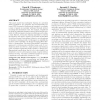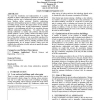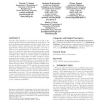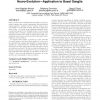119
click to vote
GECCO
2010
Springer
15 years 5 months ago
2010
Springer
We implement a weighted negative update of the covariance matrix in the CMA-ES—weighted active CMA-ES or, in short, aCMA-ES. We benchmark the IPOP-aCMA-ES and compare the perfor...
108
click to vote
GECCO
2010
Springer
15 years 5 months ago
2010
Springer
This paper argues that multiagent learning is a potential “killer application” for generative and developmental systems (GDS) because key challenges in learning to coordinate ...
120
click to vote
GECCO
2010
Springer
15 years 5 months ago
2010
Springer
The increase in the complexity of modern software has led to the commensurate growth in the size and execution time of the test suites for these programs. In order to address this...
103
Voted
GECCO
2010
Springer
15 years 5 months ago
2010
Springer
This paper presents results of the BBOB-2009 benchmarking of 31 search algorithms on 24 noiseless functions in a black-box optimization scenario in continuous domain. The runtime ...
115
click to vote
GECCO
2010
Springer
15 years 5 months ago
2010
Springer
This study proposes a simple computational model of evolutionary learning in organizations informed by genetic algorithms. Agents who interact only with neighboring partners seek ...
105
click to vote
GECCO
2010
Springer
15 years 5 months ago
2010
Springer
In this paper, we compare the (1+1)-CMA-ES to the (1+2s m)CMA-ES, a recently introduced quasi-random (1+2)-CMAES that uses mirroring as derandomization technique as well as a sequ...
122
click to vote
GECCO
2010
Springer
15 years 5 months ago
2010
Springer
We report the formulation and implementation of a genetic algorithm to address multi-objective optimisation of solar gain to buildings with the goal of minimising energy consumpti...
GECCO
2010
Springer
15 years 5 months ago
2010
Springer
121
Voted
GECCO
2010
Springer
15 years 5 months ago
2010
Springer
For many large-scale combinatorial search/optimization problems, meta-heuristic algorithms face noisy objective functions, coupled with computationally expensive evaluation times....
122
click to vote
GECCO
2010
Springer
15 years 5 months ago
2010
Springer
Neuro-evolution and computational neuroscience are two scientific domains that produce surprisingly different artificial neural networks. Inspired by the “toolbox” used by ...




